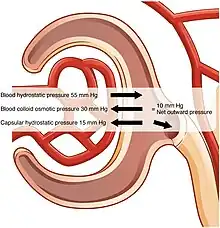Filtration coefficient
In physiology, Filtration coefficient (Kf) is the product of a biological membrane's permeability to water and the surface area of the membrane. Typical units of Kf are mL/min/mmHg. The rate of filtration across the membrane is, by definition, the product of Kf and the net filtration pressure across the membrane.[1][2][3] Kf is frequently applied to the glomerular capillaries, which filter water into Bowman's capsule to form urine. Typically, in an adult human, the net filtration pressure is 10mmHg and Kf 12.5mL/min/mmHg, giving a glomerular filtration rate (GFR) of 125mL/min. A decrease in Kf due to reduced number of glomeruli or reduced permeability will reduce the GFR at a given filtration pressure[3]

Net filtration pressure in glomerulus of the kidney
References
- "Filtration coefficient - definition of filtration coefficient by Medical dictionary". TheFreeDictionary.com. Retrieved 27 December 2016.
- "Glomerular filtration rate". Retrieved 27 December 2016.
- E. Hall, John (2011). Guyton and Hall Textbook of Medical Physiology/12th ed. United States of America. p. 181. ISBN 978-1-4160-4574-8.
{{cite book}}: CS1 maint: location missing publisher (link)
This article is issued from Wikipedia. The text is licensed under Creative Commons - Attribution - Sharealike. Additional terms may apply for the media files.